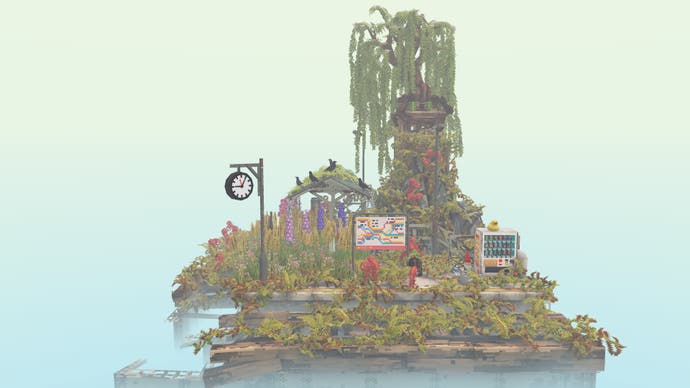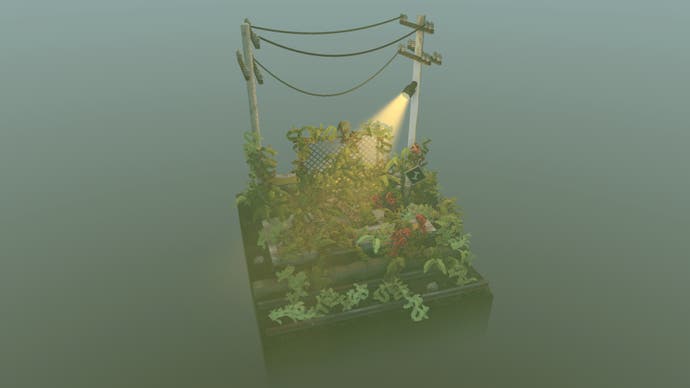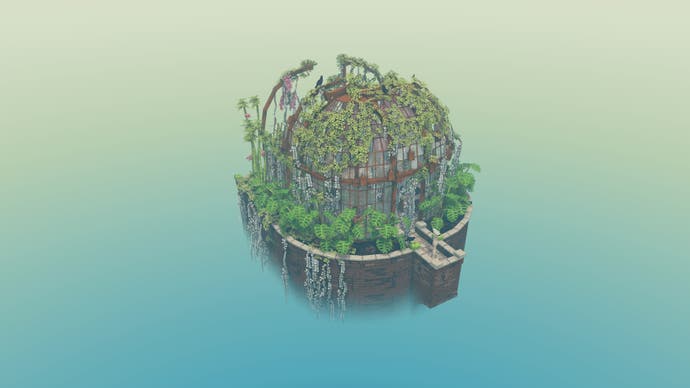Viewing our place in the world through Cloud Gardens
And a bit about Islands of Abandonment.
“The world doesn’t revolve around you” is the greatest lie you will ever be told. You are your world. Everything you see, and how you see it; everything you think, and how you think it; everything you do, and how you do it; it all comes together to produce a perception of the world - the only perception of the world that you have - that never existed before your birth, and will never exist again after your death. Then there are the footprints that we all leave as we pass through the world, both literal and metaphorical. Certain surfaces yield to our weight, as we shape the very ground that we walk on. On a wider scale, we all build and break one another’s personalities through our interactions; we create one another. On a wider scale yet, we build and (sadly, more often) break the very planet itself, changing it in ways that could never have come to pass without us.
“The world doesn’t revolve around you” is the greatest truth you will ever be told. Countless yesterdays passed millenia before your birth, and tomorrow will come whether you are there to see it or not. Of the approximately 8 billion people alive today, the percentage that will never know you existed is so high, under any other circumstances you would round it to 100 percent. Even on the immensely wider scale of humanity itself, we are not as important as we like to think we are. There is no rational way to deny the impact that we have had, and will continue to have, on Earth. However, when the last of us is gone - be that through our own arrogance, or any other means - the planet will remain. It will continue to grow and evolve.
I hold these two truths in my head without conflict. We all do, I think. I’ve recently spent some time playing Cloud Gardens, which serves to support both views, and even to put a positive spin on the latter. In order to explain why, I must first talk a little about Cal Flyn’s book Islands of Abandonment, which I've just finished reading.
Flyn's book tackles different kinds of abandonment, including people who have abandoned society, and people whom society has abandoned. It is also largely - for the first half or so of the book, at least - about human spaces that have been abandoned by people, and reclaimed by nature.
One of my biggest learnings from the book is the speed with which such places - houses, factories, entire towns - can look as though they have been abandoned for decades rather than a year or two. When given the chance, nature sweeps through our metal and concrete hives with impressive, unstoppable speed and power. Flyn even records instances of incredibly rare flora and/or fauna appearing in such places where there was no sign before. I don’t pretend to understand how this happens and, to be honest, I prefer not knowing.

Nonetheless, reading Flyn’s detailed accounts gave me a greater understanding of the speed, intricacy, prevalence, and importance of such events. More than anything. perhaps, it lent me some of her hope. Her hope that the planet is not yet beyond saving; her hope that in the battle between humanity and nature, there does not need to be a battered and broken loser.
I first played Cloud Gardens just a day or two after finishing Islands of Abandonment and, to be honest, it was for this reason that I initially didn’t like it. For a moment, it actively repelled me. The fundamental concept of Cloud Gardens is that the player scatters human detritus into a diorama - electronics, furniture, vehicles, structures - and various plants and trees use these as catalysts to spread and grow. My problem with the game was twofold: the player must also add and harvest seeds, and the player must achieve a certain level of growth in order to proceed to the next scene. They must solve a puzzle.

Flyn’s book - at least, in the parts about areas reclaimed by nature - details the beauty and wonder of what happens without human interference. Yet here was a game ostensibly emulating that process, while also demanding that the human interloper not only add unnatural decoration, but direct the actions of nature itself. I hated that; hated it with an intensity that surprised me.
But then I realised, quite apart from the fact that any game requires a certain level of interaction, that this is a good thing. It’s lightly educational, for one. After all, vines and plants and trees really do crawl over, under, and through human detritus in the way Cloud Gardens portrays. It also satisfies the human desire for a sense of control and ownership, combined with an appreciation for the beauty of nature. How on earth could one criticise that, especially in a harmless digital sphere?
Where the game really came alive for me is in the directionless creative mode - especially when I discovered the magical, delicious “unlock everything” button in the menu. Here too, I need to do all of the heavy lifting for both nature, and humanity’s discarded rubbish. Yet without a series of puzzles, with no set goal, I really don’t mind. I pass through the creation stage largely aloof, looking forward to the end result.

I look at my creations - the caravan sitting in the shade of messily crowded trees, the furniture almost hidden in a wild growth of vines and grasses, the skeletal factory threaded with greens and yellows - and I see a glimpse of a world abandoned by humanity. Perhaps even a world that has outlived it. And I do not feel sad, I do not despair. I feel serene. I also feel a hint of satisfaction due to my part in creating it, despite my determination to remove myself emotionally from the creative process. A hypocritical and paradoxical stance. A typically human one.
Perhaps I can scrape together a little integrity by revealing that I also like to open up creative mode, and then… do nothing. Just watch the ever-present birds swoop and circle amongst the clouds, waiting for a duet between humanity and nature which will only be sung if I will it. Games can be perfect for play, and perfect for creation. Sometimes - just sometimes - they can be perfect for simply being.


